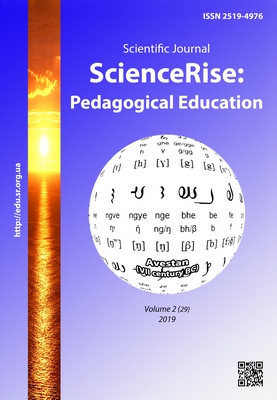General principles of vocational education and training in the tourism education system of the German speaking countries in Western Europe
DOI:
https://doi.org/10.15587/2519-4984.2019.164208Keywords:
tourism education, higher education, German-speaking countries, dual vocational trainingAbstract
The article deals with the analysis of tourism education systems of the leading countries of Western Europe, namely Germany, Austria, Switzerland and Luxembourg united in the crosslinguistic category of "German-speaking countries". The peculiarities of institutional and disciplinary components of vocational education in tourism are revealed, the educational-qualification levels of the structural model of tourism education are determined and characterized, the main functions of the vocational schools of tourism are defined, and the peculiarities of vocational training of future skilled workers in the specified countries are outlined. It is defined, that the structural model of tourism education in the German-speaking countries includes the pathway of obtaining professional qualifications, different types of educational establishments, a variety of vocational study programs and degree levels.
It is appointed, that the predominant advantage of basic tourism education in the German-speaking countries is the dual system of vocational education and training that enables students getting qualifications in the form of apprenticeship working together with enterprise training providers. A distinctive feature of higher tourism education is the binary structure in which the traditional university sector exists concurrently with the non-university higher education sector. It is defined, that the common feature of tourism education systems in German-speaking countries is the flexibility of educational process and the coherence of educational-qualification levels within vocational schools and higher institutions. It is determined, that the compliance with the principles of consistency and continuity, the focus on providing future skilled workers with the opportunity to obtain appropriate vocational training program in compliance with their needs and abilities are the basic principles of lifelong learning in tourism education. It is proved that the intense competition between organizers of tourism education in German-speaking countries contributes to their desire of following strictly the existing international education standards. The constant modernization of the content of vocational education and training, as well as cooperation with the European and non-European educational partners in the higher tourism education sphere intensifies student mobility and academic activity
References
- Pro zatverdzhennia Derzhavnoi prohramy rozvytku turyzmu na 2002–2010 roky (2002). Postanova Kabinetu ministriv Ukrainy No. 583. 29.04.2002. Available at: https://zakon.rada.gov.ua/laws/show/583-2002-%D0%BF
- Knodel, L. V. (2007). Teoriia i praktyka pidhotovky fakhivtsiv sfery turyzmu v krainakh-chlenakh Vsesvitnoi turystskoi orhanizatsii [Theory and practice of vocational training of skilled workers in tourism in UNWTO's member states]. Ternopil, 40.
- Fedorchenko, V. K. (2004). Teoretychni ta metodychni zasady pidhotovky fakhivtsiv dlia sfery turyzmu [Theoretical and methodological principles of vocational training of future skilled workers in tourism]. Kyiv: Word, 472.
- Zakordonets, N. I. (2012). Mozhlyvosti realizatsii peredovykh idei shveitsarskoho dosvidu profesiinoi pidhotovky maibutnikh fakhivtsiv sfery turyzmu u vyshchykh navchalnykh zakladakh Ukrainy [Possibilities for implementation of advanced ideas of Swiss experience of vocational training of future skilled workers in tourism within higher education establishments of Ukraine]. Scientific papers of Ternopil nation. ped university by V. Hnatyuk. Issue: Pedagogy, 3, 135–144.
- Weiermair, K., Bieger, T. (2005). Tourism Education in Austria and Switzerland: Past Problems and Future Challenges. Journal of Teaching in Travel and Tourism, 5 (1-2), 39–60. doi: http://doi.org/10.1300/j172v05n01_03
- Airey, D., Tribe, J., Benckendorff, P., Xiao, H. (2014). The Managerial Gaze: the long tail of tourism education and research. Journal of Travel Research, 54 (2), 139–151. doi: http://doi.org/10.1177/0047287514522877
- Fomenko, N. A. (2005). Pedahohika vyshchoi shkoly: metodolohiia, standartyzatsiia turystskoi osvity [Higher School Pedagogy: Methodology, Standardization of Tourist Education]. Kyiv: Word, 216.
- Tapasei, W., Kalwajin, E., Wightman, P., Wightman P. (1997). Introduction to Tourism. New Zealand, 29.
- Hochschule Stralsund – University of Applied Sciences. Available at: https://www.hochschule-stralsund.de
- Swiss Institute for Management & Hospitality (SWISS IM&H). Available at: http://swissimh.ch/info/
- Duale Hochschule Baden Württemberg Ravensburg. Available at: https://www.ravensburg.dhbw.de/startseite.html
- Sporthotel Pontresina. Available at: https://www.sporthotel.ch/
- Hotelleriesuisse. Available at: https://www.hotelbildung.ch/de/pub/index.cfm
- Tourismusschule Bad Hofgastein. Available at: https://ts-badhofgastein.at/warum-bad-hofgastein/
Downloads
Published
How to Cite
Issue
Section
License
Copyright (c) 2019 Olesia Samokhval, Natalia Voinarovska

This work is licensed under a Creative Commons Attribution 4.0 International License.
Our journal abides by the Creative Commons CC BY copyright rights and permissions for open access journals.
Authors, who are published in this journal, agree to the following conditions:
1. The authors reserve the right to authorship of the work and pass the first publication right of this work to the journal under the terms of a Creative Commons CC BY, which allows others to freely distribute the published research with the obligatory reference to the authors of the original work and the first publication of the work in this journal.
2. The authors have the right to conclude separate supplement agreements that relate to non-exclusive work distribution in the form in which it has been published by the journal (for example, to upload the work to the online storage of the journal or publish it as part of a monograph), provided that the reference to the first publication of the work in this journal is included.








